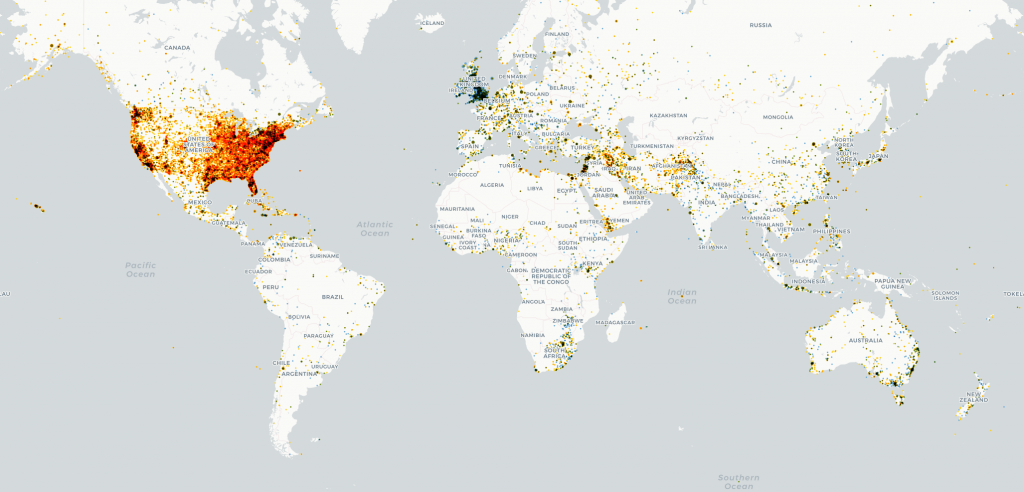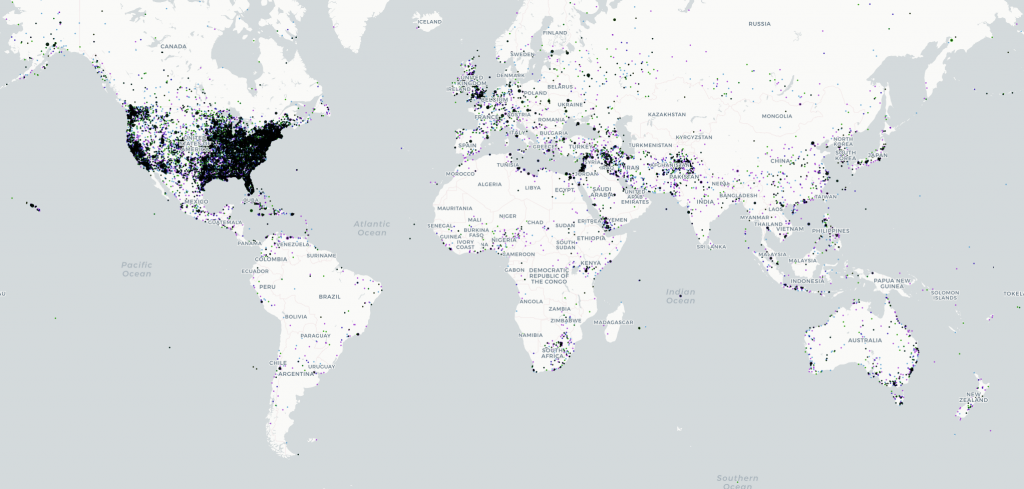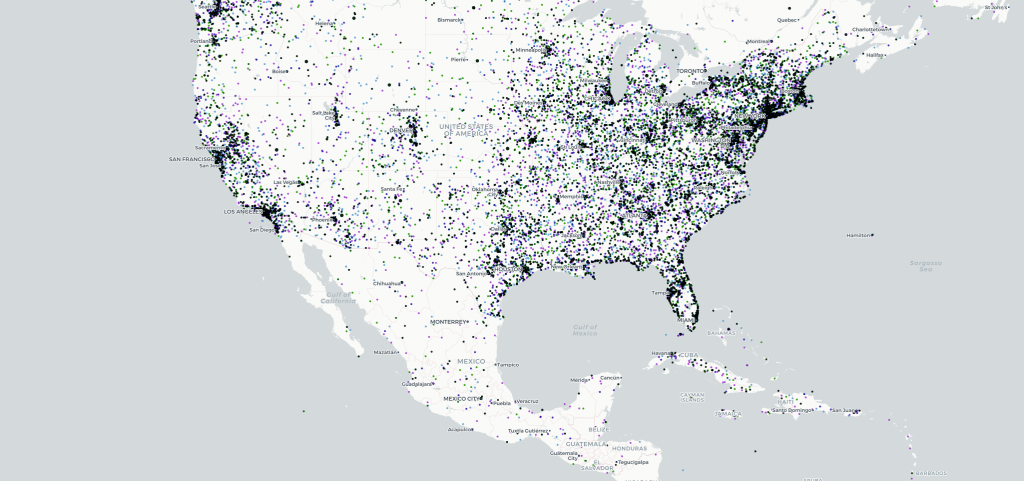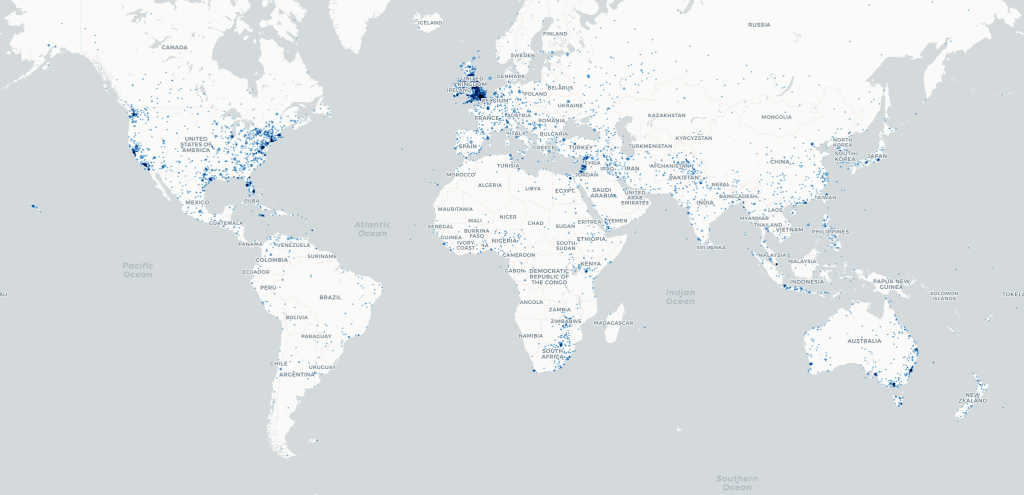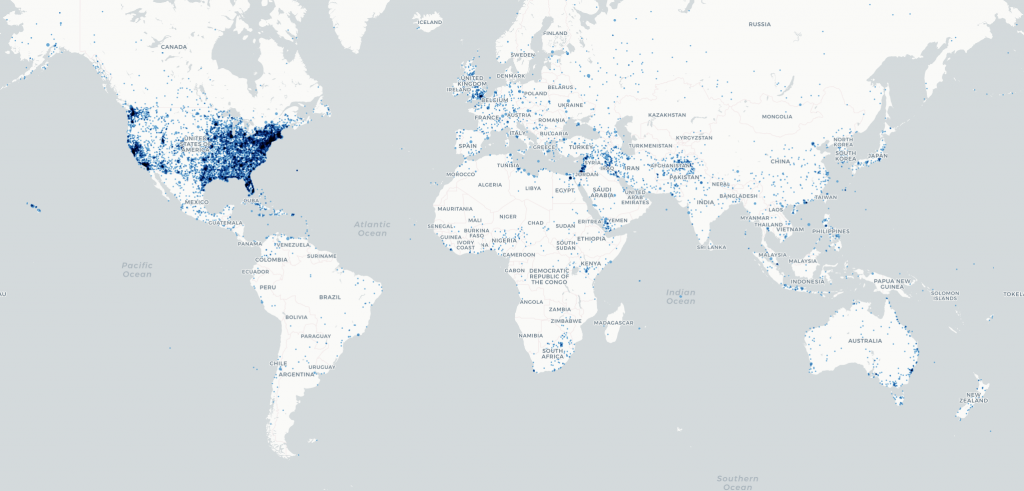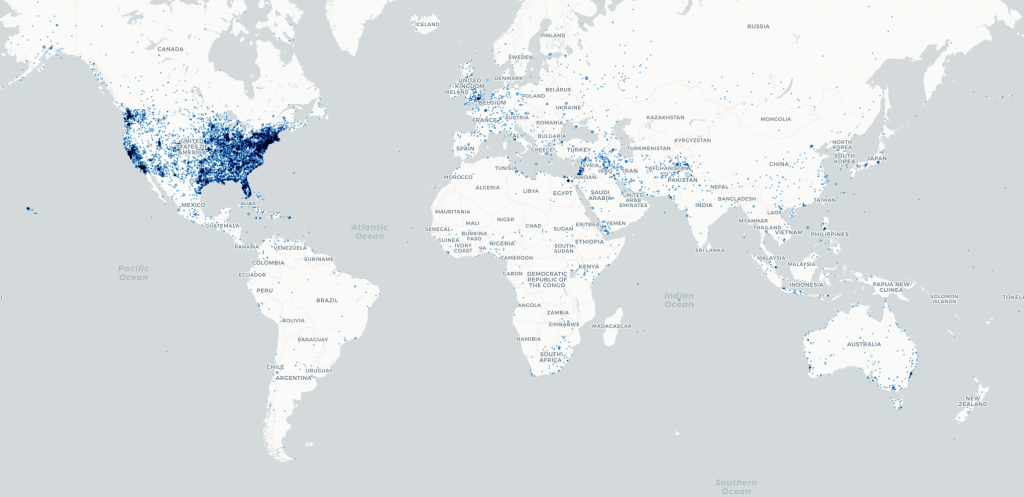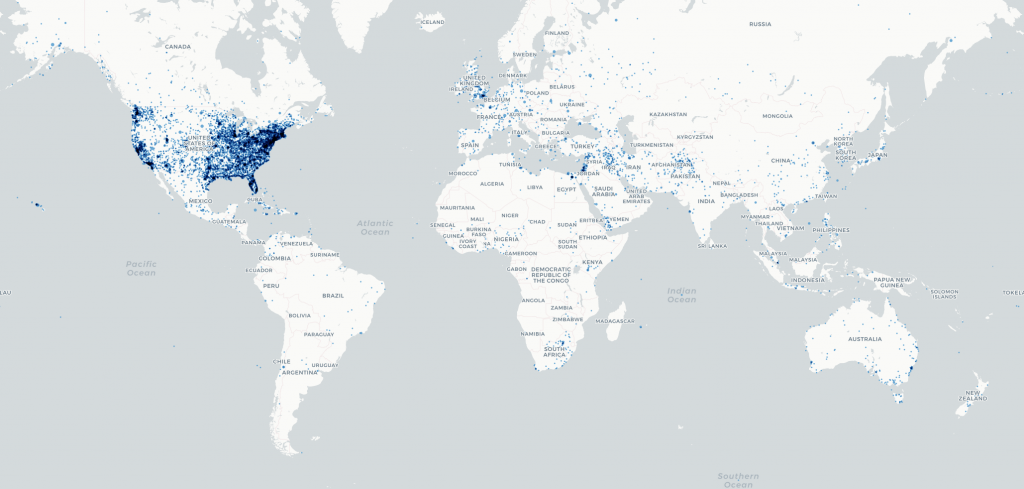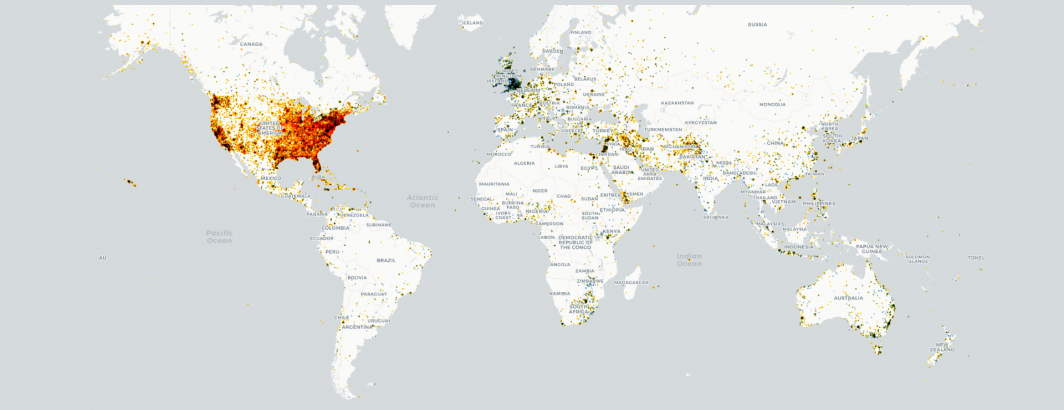
Nearly half a decade ago one of the first major visualizations we created using the Internet Archive's Television News Archive was an animated map of more than 400,000 hours of television coverage. We followed that two years ago with a city-level snapshot of all of the locations mentioned 2009-2016 in American television news and a choropleth showing the country-level focus. We also created a more modern animation that showed the day-by-day geographic focus of the major networks like rainfall washing across the globe.
Fast forward to today and we spend a lot of time teasing apart the very different worlds of the major television networks in terms of what stories they choose to cover and the tone they take with that coverage. Yet, one question that has stuck with us since our early days mapping the Television Archive is to degree to which the major networks differ in their geographic focuses. In short, while CNN, FOX News and MSNBC may offer very different views of our world, to what degree do those views deviate geographically? Does CNN systematically cover certain parts of the world more often than MSNBC? Does FOX cover events in certain parts of the world more than its competitors? What about the two years of BBC News the Archive has monitored?
To explore these questions, we created a series of maps that show the geography of these four networks (BBC News, CNN, Fox News and MSNBC) from 2009-2018 for CNN, Fox News and MSNBC and 2017-2018 for BBC News. Every single location mentioned on any show on the network over that time period that GDELT could recognize is recorded in the maps below. To compile this list of locations we run specialized textual geocoding algorithms over the raw closed captioning of each network. Raw captioning is imperfect at best, with frequent typographical errors, no capitalization, little punctuation and many other errors. Television's fast pace poses unique challenges for contextual disambiguation in that many very different locations in very different parts of the world can all be mentioned rapidly together, with visual onscreen cues helping a human viewer disambiguate them. Thus, geocoding raw captioning text is far more complex and error-prone than geocoding textual news coverage and the maps below have a higher error rate than our textual news geographic visualizations.
In the maps below we also include only subnational mentions, such as cities, states, counties, landmarks, etc. Mentions that include only a country name are excluded. This has the effect of reducing representation of some parts of the world in which US and UK television networks tend to assume their audiences are unfamiliar with most locations in those regions and refer primarily only to country names when covering them, rather than listing the specific cities the stories involve.
To date we've processed more than 1.17 million shows totaling more than a million hours of television news programming from the Internet Archive through the GKG system, creating a geographic record of the locations the major stations have mentioned over the past decade. A single line of SQL in Google BigQuery gives us an instant geographic dataset in just a handful of seconds and Carto allows us to turn that data into a series of beautiful maps in just a few seconds more.
We'd like to extend a special thanks to Roger Macdonald and the incredible Internet Archive Television News Archive team for creating such an immensely powerful and one-of-a-kind resource. We'd also like to thank Carto for the use of their mapping platform in creating the final maps.
BBC News Vs CNN + FOX News + MSNBC
Our first map, below, compares the combined geographic coverage of CNN, FOX News and MSNBC 2009-2018 (in yellow) against BBC News 2017-2018 (in blue). Locations that received heavy coverage across all three US networks will appear as a dark yellow on through orange and even red for locations that received heavily cross-network coverage. In contrast, locations that are light yellow mean only one of the US networks focused on it, while blue locations are those BBC News exclusively focused on. Finally, green locations are those that received heavy coverage on both the US networks and BBC News.
Perhaps most obviously, BBC News does a far better job of covering the UK, Europe, South Africa, India, while the US networks cover the US far more extensively. The Middle East is more extensively covered by US networks, though hotbeds like Israel, Syria, Afghanistan and Iraq are interesting to both.
You can also download a higher resolution version of this map.
CNN Vs Fox News Vs MSNBC
How do CNN, Fox News and MSNBC compare to each other 2009-2018? In the map below, all locations mentioned on CNN are displayed in purple, Fox News in blue and MSNBC in green (black indicates a location that is heavily mentioned across multiple networks). Looking across the world the most immediate finding is that there does not appear to be any major systematic differences among the network other than CNN having slightly more extensive international geographic coverage.
You can also download a higher resolution version of this map.
Zooming into the United States, you can see that even within their home country, none of the three networks appears to have systematically better coverage than the others. Nor do they appear to have any kind of distinct geographic focus. While all three networks cover the eastern half of the US and a handful of major cities more heavily than the rest of the country, they do not appear to substantially differ in the locations they give the most attention to.
You can also download a higher resolution version of this map.
BBC News (2017-2018)
All locations mentioned on BBC News 2017-2018. You can also download a higher resolution version of this map.
CNN (2009-2018)
All locations mentioned on CNN 2009-2018. You can also download a higher resolution version of this map.
FOX News (2009-2018)
All locations mentioned on FOX News 2009-2018. You can also download a higher resolution version of this map.
MSNBC (2009-2018)
All locations mentioned on MSNBC 2009-2018. You can also download a higher resolution version of this map.
TECHNICAL DETAILS
To create the maps above, we simply used the following four SQL statements with BigQuery, appended their results to a single output table and then exported it as a CSV file. We took that CSV file and brought in into Carto to create the maps themselves, using a standard "Bubble" map type with "multiply" compositing.
SELECT 'CNN' network, lat, long, COUNT(*) as nummentions FROM ( select ROUND(FLOAT(REGEXP_EXTRACT(SPLIT(V2Locations,';'),r'^[2-5]#.*?#.*?#.*?#.*?#(.*?)#.*?#')), 3) as lat, ROUND(FLOAT(REGEXP_EXTRACT(SPLIT(V2Locations,';'),r'^[2-5]#.*?#.*?#.*?#.*?#.*?#(.*?)#')), 3) as long from [gdelt-bq:gdeltv2.iatvgkg] where (SourceCommonName ='CNN' or SourceCommonName ='CNNW') ) where lat is not null and long is not null group by lat,long
SELECT 'MSNBC' network, lat, long, COUNT(*) as nummentions FROM ( select ROUND(FLOAT(REGEXP_EXTRACT(SPLIT(V2Locations,';'),r'^[2-5]#.*?#.*?#.*?#.*?#(.*?)#.*?#')), 3) as lat, ROUND(FLOAT(REGEXP_EXTRACT(SPLIT(V2Locations,';'),r'^[2-5]#.*?#.*?#.*?#.*?#.*?#(.*?)#')), 3) as long from [gdelt-bq:gdeltv2.iatvgkg] where (SourceCommonName ='MSNBC' or SourceCommonName ='MSNBCW') ) where lat is not null and long is not null group by lat,long
SELECT 'FOXNEWS' network, lat, long, COUNT(*) as nummentions FROM ( select ROUND(FLOAT(REGEXP_EXTRACT(SPLIT(V2Locations,';'),r'^[2-5]#.*?#.*?#.*?#.*?#(.*?)#.*?#')), 3) as lat, ROUND(FLOAT(REGEXP_EXTRACT(SPLIT(V2Locations,';'),r'^[2-5]#.*?#.*?#.*?#.*?#.*?#(.*?)#')), 3) as long from [gdelt-bq:gdeltv2.iatvgkg] where (SourceCommonName ='FOXNEWS' or SourceCommonName ='FOXNEWSW') ) where lat is not null and long is not null group by lat,long
SELECT 'BBCNEWS' network, lat, long, COUNT(*) as nummentions FROM ( select ROUND(FLOAT(REGEXP_EXTRACT(SPLIT(V2Locations,';'),r'^[2-5]#.*?#.*?#.*?#.*?#(.*?)#.*?#')), 3) as lat, ROUND(FLOAT(REGEXP_EXTRACT(SPLIT(V2Locations,';'),r'^[2-5]#.*?#.*?#.*?#.*?#.*?#(.*?)#')), 3) as long from [gdelt-bq:gdeltv2.iatvgkg] where (SourceCommonName ='BBCNEWS') ) where lat is not null and long is not null group by lat,long
